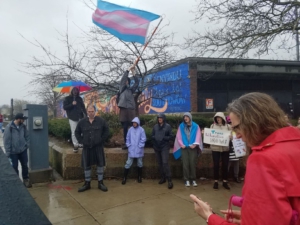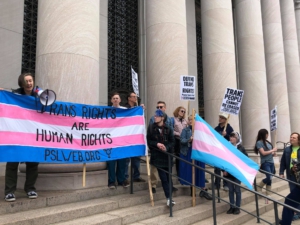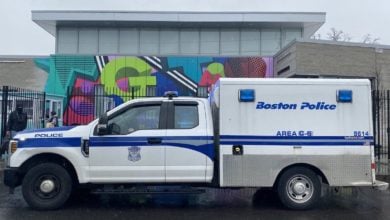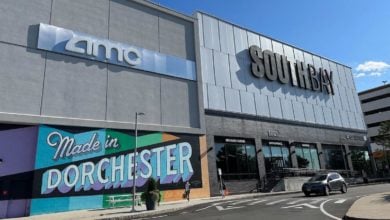Boston, Massachusetts: “Which side are you on?”
LGBTQ grassroots organizations and their supporters from across Boston gathered on Sunday, March 31 to celebrate the International Trans Day of Visibility. The event took place in the Southwest Corridor Park in Jamaica Plain, and despite the inclement weather, over 50 people showed up in visibility and solidarity.
“We are visible in the rain, in the snow, in the sun,” joked Kaleigh O’Keefe, an organizer with Pride at Work, to the crowd standing in the pouring rain.
The international holiday was originally founded by trans activist Rachel Crandall in 2009 as an occasion to celebrate the lives and achievements of transgender people. Judy Heithmar, a lead organizer of the Boston celebration noted, “The one national day that trans people had for recognition in this country was the Trans Day of Remembrance, and I think that we’ve moved into a space now where there’s enough of us out and representation all over the place that we really need to celebrate our visibility.”

The event opened with speeches by various transgender organizers representing the Mass Trans Political Association, Pride at Work Eastern Massachusetts, the Rainbow Times, the Party for Socialism and Liberation and Massachusetts Union of the Homeless. Many speakers highlighted the importance of celebrating visibility, yet emphasized the need to move beyond visibility and towards trans liberation, especially in our current repressive political climate.
The disproportionate impact of poverty on the transgender community was a major theme throughout the rally. Dylan Citron, organizer with the Party for Socialism and Liberation, noted that one in five transgender people experience homelessness at some point in their lifetime and trans people are are four times as likely to make less than $10,000/year than the rest of the population.
“Capitalism is incapable of solving the problems we face as an oppressed community. In fact, it creates them,” Citron explained, drawing shouts of approval from the crowd. “Capitalists all the world over don’t care about the rights of trans people or any working people. They only care about profits.”
After the speeches, the mood remained upbeat and celebratory, with time allotted for people to share poems, songs and personal stories. The celebration concluded with a march and as the rain intensified, so did the crowd’s chants. The demonstrators bellowed the legendary union song “Which side are you on?” commemorating trans activists of the past and present, and driving home the revolutionary tone of the event. Organizers invited attendees to take part in the first National Trans Visibility March on Washington this coming September, as the struggle for trans liberation continues.
New Haven, Connecticut: “It’s not easy, but it can be done.”

At 11 am on March 31, about three dozen activists stood on the steps of the New Haven Federal Building — a vibrant splash of color against the stark white stone columns. The day began with a speakout and open mic, with many speakers and attendees acknowledging predecessors in the struggle, such as Marsha P. Johnson and Silvia Rivera. The event was organized by the Party for Socialism and Liberation and Trans@Yale, and supported by the New Haven Pride Center. After the speakout, demonstrators marched around downtown New Haven, chanting, cheering and being applauded by passers-by, finally arriving at the New Haven Pride Center for a free lunch and social.
Nash Keyes from Trans@Yale and Trans Lifeline also hosted a free showing of Major!, about Miss Major Griffin-Gracy, a prominent activist during the Stonewall Riots who advocated for the rights of her sister transgender women of color, especially in the prison system and on the streets. In the film, Miss Major points out that “visibility” is what gets some transgender people killed, especially trans women of color. Keyes brought this forth in their speech that the Transgender day of Visibility “should be a day to sit with that, and for those of us who are white, interrogate ourselves as to what we need to do to support the trans people of color in our lives, communities, and larger world.”
One young child in a floral dress and leggings took to the bullhorn to proudly remind the attendees that “gender-fluid people are in this too.”
Trans visibility was celebrated by cisgender people in New Haven as well. PSL organizer and Quinnipiac tribe member Norm Clement spoke to the inherent ties between colonialism and transphobia and urged all people who stand up against systemic racism, colonialism and imperialism to also stand for trans liberation.
Reed Miller, an activist with Black and Pink, a nationwide prison industrial complex abolitionist organization, told Liberation News “it’s important to be visible to set precedent for folks who are beginning to transition, that it’s not impossible — it’s not easy, but it can be done.”
“When I think about the future I want for myself as a trans person and for my trans community,” Keyes continued, standing against the stone columns of the Federal Building. “I want a world where visibility is a positive and powerful thing equally accessible to all, and not a product of privilege.”






